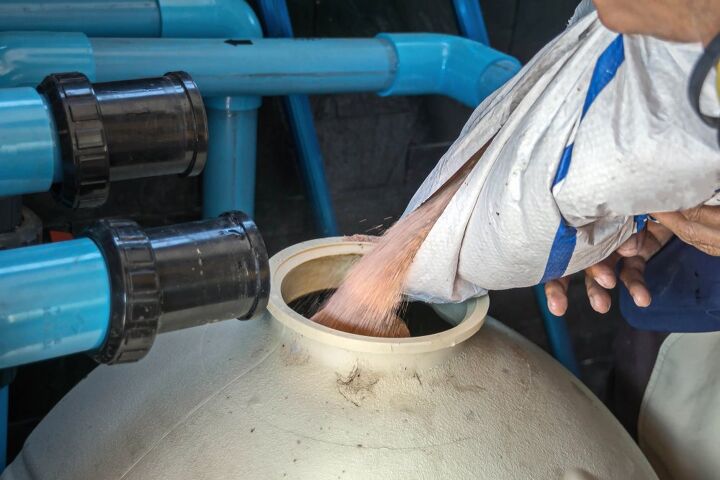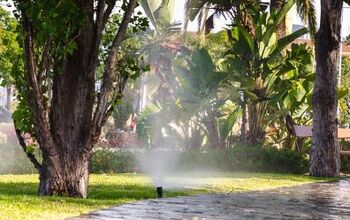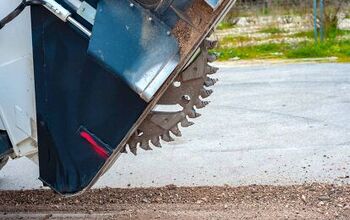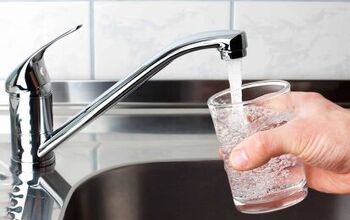Can I Use A Sand Filter With A Saltwater Pool System?

Saltwater pools are more popular than ever before, and rightfully so. They offer a more eco-friendly alternative to bleach for your pool’s sanitation, and also make you feel like you are in the middle of the ocean. Though saltwater pools are hip and trendy AF, there are a lot of questions to ask about how to filter them. I mean, can a regular sand filter work?
You may use a sand filter with a saltwater pool system, which will help with filtering out particles from your pool’s water. Compared to other filters, a sand filter is not so effective, given it can only filter out particles that are 10-20 microns in size. In comparison, a cartridge filter can and a D.E. filter can take out larger particles, making such filters at least twice as effective.
It’s totally understandable if you want to try to save some money on a pool filter, especially when it comes to matters like saltwater pools. This guide will give you a better understanding of what it can do for you.
Do You a Need Pool, Spa, or Hot Tub Contractor?
Get free, zero-commitment quotes from pro contractors near you.

Can You Use Sand Filters For Saltwater Pools?
You absolutely can. Sand filters are extremely popular because they are affordable and also get the job done. Since sand filters do not catch particles that are as small as salt, they won’t suddenly clog up due to the content of salt in your pool. Most pool owners prefer to use sand filters, but that’s not the only type of filter that you can use for saltwater pools. (Don’t worry, we’ll talk about that later.)
Salt does not make a major difference in how well a filter will work. The particles in dissolved salt are actually smaller than what’s in water. So, you never have to worry about salt clogging up your filter.
What Other Pool Filters Can You Use For A Saltwater Pool?
For the most part, you really can’t go wrong with any filter type. Saltwater doesn’t really hit filters in a way that would cause a clog, even with more advanced types of filtration systems. Some other top choices include:
- Cartridge Filters. A pricey option, sure, but there’s a lot of love for these filters to be had. Cartridge filters are easy to switch out and also have better filtration than typical sand filters. A cartridge filter will last the longest, but the individual cartridges inside need to be replaced every six months to a year. This can add up significantly over time.
- D.E Filters. These filters are similar to sand, except that they use diatomaceous earth to filter out bad stuff. This is a more effective filtration system than sand, and also can be pricier. They work very similarly to sand. The only difference is the filtering material that’s used.
- Saltwater Filter. This is technically what makes a saltwater pool a saltwater pool, but we’re adding it anyway. It’s actually not a filter, per se, but a way for salt to be introduced to your pool. The salt that is deposited in your water through this filter can help kill off bacteria, making your pool safer for swimming.
Do You Need To Add A Filter To A Saltwater Pool?
Here’s the thing that people often forget about saltwater pools. While having a saltwater pool can help kill off certain types of bacteria, the truth is that it’s not a cure-all for pool sanitation. Salt is great for killing off microbes and is a great substitute for chlorine in that respect. However, it doesn’t kill off fungi or other plant life.
In order to ensure that you don’t have algae and other plant matter in your pool, you need to have a filter in place. Otherwise, you will begin to notice mold running amok in your pool. So, please don’t skip that filter. You really do need it.
Why Do Saltwater Pools Not Need Chlorine But Require A Filter?
If you’re still confused about why saltwater pools need a filter, it’s best to break it down in another way. The saltwater aspect doesn’t actually do the same thing as a filter. Rather, it acts like chlorine. The salt in pools contains chlorine naturally. When the salt gets dissolved in water, it breaks down into its basic ions: sodium and chlorine.
In other words, the salt that you have in the pool serves a totally different purpose. The salt acts like a natural chlorine tablet that gets released over a longer period of time. People and animals tend to find it less harsh than, say, shocking a pool with bleach or tablets. However, the salt doesn’t get rid of other pollutants.
Need a metaphor? I got you. The filter acts like a vacuum cleaner for your pool, while your chlorine acts like an all-purpose sprayable cleaner.
How Much Should You Spend On A Saltwater Pool’s Sand Filter?
The good news about having a saltwater pool is that you don’t have to get a special filter for it, despite it being a “special” type of pool. You can choose virtually any type of sand filter that’s been labeled appropriate for your pool’s size. With that said, most sand filters will cost between $300 to $1000 to install depending on the size of the filter as well as any installation fees you may have.
What’s The Best Type Of Filter For A Saltwater Pool?
The best type of filter for a saltwater pool is going to be a DE filter. Diatomaceous earth is capable of filtering particles that are far smaller than cartridge or sand filters’ smallest. This gives you a cleaner pool that feels amazing with as few adulterants as humanly possible. With that said, DE filters tend to be rarer than sand filters for several reasons.
Along with requiring replacement on a faster basis, the truth is that they are also notoriously pricey. Since most people do not want to drop $1000 on a different filter, they are still fairly rare to see. So don’t feel bad if you can’t get one for your pool. It’s not the standard by any means of the word.
Do You a Need Pool, Spa, or Hot Tub Contractor?
Get free, zero-commitment quotes from pro contractors near you.

Related Questions
Can a saltwater pool damage concrete?
Saltwater generally does not damage concrete as long as it is well-maintained and monitored. However, it can become a risk to your concrete if it is left unwatched for too long. Saltwater can become acidic over time. This, in turn, can cause the concrete holding your pool’s water to get damaged or even corroded.Regular maintenance and a watchful eye over your pool’s pH levels is what you need to do to ensure that your concrete stays safe. With that said, almost all types of concrete will eventually need to be patched. If your pool is old, you might want to save up for that project sooner rather than later.
Why did my hair turn green in a saltwater pool?
You might have switched to saltwater bathing in hopes of avoiding seeing your hair turn green. However, you may have already noticed that it didn’t work as well as you hoped. This is because saltwater has free chlorine particles in it. It’s the chlorine that tends to cause hair to turn green. A good way to avoid green hair is to wear a bathing cap, or to rinse your hair with a specialty shampoo.Even if it does turn green, it’s not the end of the world. The author of this article currently has green hair.
Can you turn a regular pool into a saltwater pool?
Yes, and it’s actually becoming crazily popular. You actually can get lower maintenance bills if you make the conversion. However, you can’t just dump salt into your pool and hope for the best. You will need to have a pool saltwater conversion unit if you want to enjoy the benefits of saltwater ownership. This can be somewhat pricey upfront, but don’t worry. You always make up your investment in due time.

Ossiana Tepfenhart is an expert writer, focusing on interior design and general home tips. Writing is her life, and it's what she does best. Her interests include art and real estate investments.
More by Ossiana Tepfenhart



























